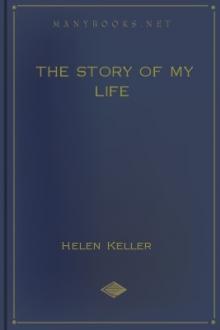The World I Live In by Helen Keller (best e reader for manga txt) 📕

- Author: Helen Keller
- Performer: -
Book online «The World I Live In by Helen Keller (best e reader for manga txt) 📕». Author Helen Keller
And thinner, clearer, farther going!
O sweet and far from cliff and scar
The horns of Elfland faintly blowing!
Nor can I distinguish easily a tune that is sung. But by placing my hand on another's throat and cheek, I enjoy the changes of the voice. I know when it is low or high, clear or muffled, sad or cheery. The thin, quavering sensation of an old voice differs in my touch from the sensation of a young voice. A Southerner's drawl is quite unlike the Yankee twang. Sometimes the flow and ebb of a voice is so enchanting that my fingers quiver with exquisite pleasure, even if I do not understand a word that is spoken.
On the other hand, I am exceedingly sensitive to the harshness of noises like grinding, scraping, and the hoarse creak of rusty locks. Fog-whistles are my vibratory nightmares. I have stood near a bridge in process of construction, and felt the tactual din, the rattle of heavy masses of stone, the roll of loosened earth, the rumble of engines, the dumping of dirt-cars, the triple blows of vulcan hammers. I can also smell the fire-pots, the tar and cement. So I have a vivid idea of mighty labours in steel and stone, and I believe that I am acquainted with all the fiendish noises which can be made by man or machinery. The whack of heavy falling bodies, the sudden shivering splinter of chopped logs, the crystal shatter of pounded ice, the crash of a tree hurled to the earth by a hurricane, the irrational, persistent chaos of noise made by switching freight-trains, the explosion of gas, the blasting of stone, and the terrific grinding of rock upon rock which precedes the collapse—all these have been in my touch-experience, and contribute to my idea of Bedlam, of a battle, a waterspout, an earthquake, and other enormous accumulations of sound.
Touch brings me into contact with the traffic and manifold activity of the city. Besides the bustle and crowding of people and the nondescript grating and electric howling of street-cars, I am conscious of exhalations from many different kinds of shops; from automobiles, drays, horses, fruit stands, and many varieties of smoke.
The air sharp and dusty
With lime and with sand,
That no one can stand,
Make the street impassable,
The people irascible,
Until every one cries,
As he trembling goes
With the sight of his eyes
And the scent of his nose
Quite stopped—or at least much diminished—
"Gracious! when will this city be finished?"[B]
To face page 70
The city is interesting; but the tactual silence of the country is always most welcome after the din of town and the irritating concussions of the train. How noiseless and undisturbing are the demolition, the repairs and the alterations, of nature! With no sound of hammer or saw or stone severed from stone, but a music of rustles and ripe thumps on the grass come the fluttering leaves and mellow fruits which the wind tumbles all day from the branches. Silently all droops, all withers, all is poured back into the earth that it may recreate; all sleeps while the busy architects of day and night ply their silent work elsewhere. The same serenity reigns when all at once the soil yields up a newly wrought creation. Softly the ocean of grass, moss, and flowers rolls surge upon surge across the earth. Curtains of foliage drape the bare branches. Great trees make ready in their sturdy hearts to receive again birds which occupy their spacious chambers to the south and west. Nay, there is no place so lowly that it may not lodge some happy creature. The meadow brook undoes its icy fetters with rippling notes, gurgles, and runs free. And all this is wrought in less than two months to the music of nature's orchestra, in the midst of balmy incense.
The thousand soft voices of the earth have truly found their way to me—the small rustle in tufts of grass, the silky swish of leaves, the buzz of insects, the hum of bees in blossoms I have plucked, the flutter of a bird's wings after his bath, and the slender rippling vibration of water running over pebbles. Once having been felt, these loved voices rustle, buzz, hum, flutter, and ripple in my thought forever, an undying part of happy memories.
Between my experiences and the experiences of others there is no gulf of mute space which I may not bridge. For I have endlessly varied, instructive contacts with all the world, with life, with the atmosphere whose radiant activity enfolds us all. The thrilling energy of the all-encasing air is warm and rapturous. Heat-waves and sound-waves play upon my face in infinite variety and combination, until I am able to surmise what must be the myriad sounds that my senseless ears have not heard.
The air varies in different regions, at different seasons of the year, and even different hours of the day. The odorous, fresh sea-breezes are distinct from the fitful breezes along river banks, which are humid and freighted with inland smells. The bracing, light, dry air of the mountains can never be mistaken for the pungent salt air of the ocean. The air of winter is dense, hard, compressed. In the spring it has new vitality. It is light, mobile, and laden with a thousand palpitating odours from earth, grass, and sprouting leaves. The air of midsummer is dense, saturated, or dry and burning, as if it came from a furnace. When a cool breeze brushes the sultry stillness, it brings fewer odours than in May, and frequently the odour of a coming tempest. The avalanche of coolness which sweeps through the low-hanging air bears little resemblance to the stinging coolness of winter.
The rain of winter is raw, without odour, and dismal. The rain of spring is brisk, fragrant, charged with life-giving warmth. I welcome it delightedly as it visits the earth, enriches the streams, waters the hills abundantly, makes the furrows soft with showers for the seed, elicits a perfume which I cannot breathe deep enough. Spring rain is beautiful, impartial, lovable. With pearly drops it washes every leaf on tree and bush, ministers equally to salutary herbs and noxious growths, searches out every living thing that needs its beneficence.
The senses assist and reinforce each other to such an extent that I am not sure whether touch or smell tells me the most about the world. Everywhere the river of touch is joined by the brooks of odour-perception. Each season has its distinctive odours. The spring is earthy and full of sap. July is rich with the odour of ripening grain and hay. As the season advances, a crisp, dry, mature odour predominates, and golden-rod, tansy, and everlastings mark the onward march of the year. In autumn, soft, alluring scents fill the air, floating from thicket, grass, flower, and tree, and they tell me of time and change, of death and life's renewal, desire and its fulfilment.
SMELL, THE FALLEN ANGEL VI SMELL, THE FALLEN ANGELIn my experience smell is most important, and I find that there is high authority for the nobility of the sense which we have neglected and disparaged. It is recorded that the Lord commanded that incense be burnt before him continually with a sweet savour. I doubt if there is any sensation arising from sight more delightful than the odours which filter through sun-warmed, wind-tossed branches, or the tide of scents which swells, subsides, rises again wave on wave, filling the wide world with invisible sweetness. A whiff of the universe makes us dream of worlds we have never seen, recalls in a flash entire epochs of our dearest experience. I never smell daisies without living over again the ecstatic mornings that my teacher and I spent wandering in the fields, while I learned new words and the names of things. Smell is a potent wizard that transports us across a thousand miles and all the years we have lived. The odour of fruits wafts me to my Southern home, to my childish frolics in the peach orchard. Other odours, instantaneous and fleeting, cause my heart to dilate joyously or contract with remembered grief. Even as I think of smells, my nose is full of scents that start awake sweet memories of summers gone and ripening grain fields far away.
The faintest whiff from a meadow where the new-mown hay lies in the hot sun displaces the here and the now. I am back again in the old red barn. My little friends and I are playing in the haymow. A huge mow it is, packed with crisp, sweet hay, from the top of which the smallest child can reach the straining rafters. In their stalls beneath are the farm animals. Here is Jerry, unresponsive, unbeautiful Jerry, crunching his oats like a true pessimist, resolved to find his feed not good—at least not so good as it ought to be. Again I touch Brownie, eager, grateful little Brownie, ready to leave the juiciest fodder for a pat, straining his beautiful, slender neck for a caress. Near by stands Lady Belle, with sweet, moist mouth, lazily extracting the sealed-up cordial from timothy and clover, and dreaming of deep June pastures and murmurous streams.
The sense of smell has told me of a coming storm hours before there was any sign of it visible. I notice first a throb of expectancy, a slight quiver, a concentration in my nostrils. As the storm draws nearer, my nostrils dilate the better to receive the flood of earth-odours which seem to multiply and extend, until I feel the splash of rain against my cheek. As the tempest departs, receding farther and farther, the odours fade, become fainter and fainter, and die away beyond the bar of space.
I know by smell the kind of house we enter. I have recognized an old-fashioned country house because it has several layers of odours, left by a succession of families, of plants, perfumes, and draperies.
In the evening quiet there are fewer vibrations than





Comments (0)